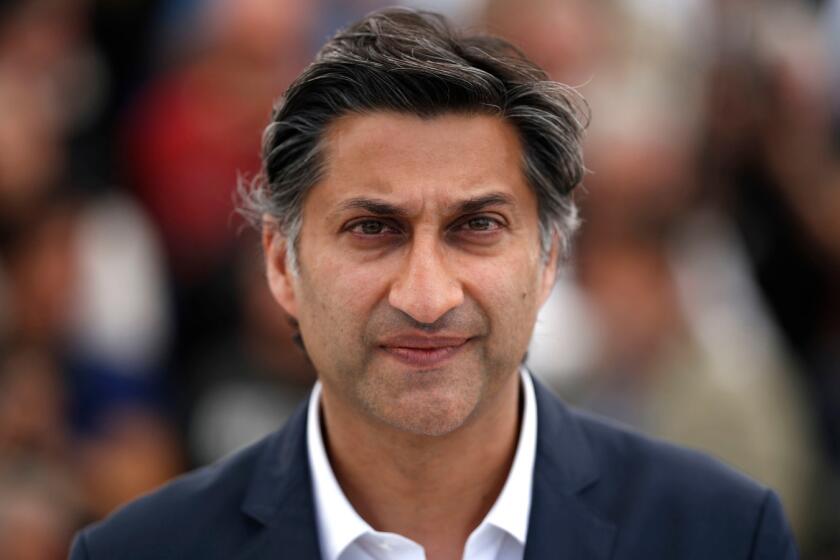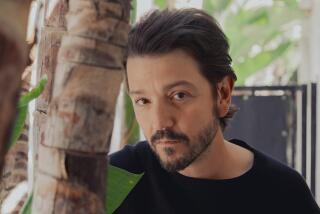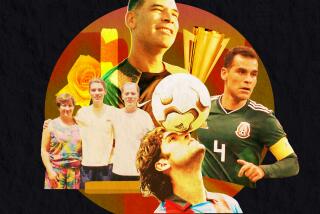‘Diego Maradona’ documentary expertly charts the rise and fall of a soccer superstar
- Share via
Sports and culture love their superheroes, antiheroes and villains. And as director Asif Kapadia makes dazzlingly clear in his new documentary “Diego Maradona,” about the Argentine soccer player often called the greatest of all time, the world got all three archetypes in one brilliantly gifted and self-destructive individual.
A shantytown kid who rose to single-handedly upend Italian soccer and win the World Cup for his home country of Argentina, Maradona was also a once-in-a-generation talent who let unchecked appetites eat away at his godlike status. To be beloved and hated, respected and pitied, glorified and ridiculed, takes some doing, which gives Maradona’s story not just the stuff of sports-saga excitement, but also the contours of Greek tragedy (with a bit of mafia cautionary tale thrown in).
Though a tad overlong at two-hours-plus — even as it condenses its framing to the footballer’s 1980s stint in Naples, Italy — Kapadia’s handling of Maradona’s eventful rise and ignominious decline is a bracing, well-controlled run across a rocky pitch.
Following the same invigorating archival-storytelling template Kapadia used for his acclaimed biodocs about the all-too-short lives of Brazilian race car driver Ayrton Senna (“Senna”) and British pop singer Amy Winehouse (the Oscar-winning “Amy”), “Diego Maradona” uses historical immersion through previously filmed footage.
In this case, Kapadia, once again working with editor Chris King, assembled the narrative mostly from a treasure trove of hundreds of hours of previously unseen material shot by a pair of cameramen hired to document the soccer star’s life.
At the same time, adding just the right amount of narrated context are new audio interviews with Maradona himself and key figures, including his wife Claudia Villafañe, sister Maria Rosa, physio trainer Fernando Signorini, team colleagues and a handful of reporters who covered him his career. Their voices over the footage are like floating details in a memory dream, and the effect is both judiciously informative and hypnotic.
That sense of entering a private world of thrill and risk is there from the get-go when the movie opens like a cannon shot, with the viewer inside a car hurtling through Naples in 1984, a Giorgio Moroder-like disco groove blasting as clips flash by of Maradona’s promising-but-unfulfilled career prior to signing with the worst team in Italy, in one of the poorest and denigrated regions of Europe, and controlled by the Camorra mob syndicate.
The sequence ends, appropriately, with the car screeching to a halt at Naples’ San Paolo stadium, and leaving you thoroughly pumped for a rags-to-pitches story of an undersized dynamo bringing glory to himself, racially antagonized Southern Italians, and — at the 1986 World Cup — an Argentina reeling from the Falklands war.
It’s not as if master documentarian Asif Kapadia, whose films have profiled Formula One legend Ayrton Senna and revered singer Amy Winehouse, is unfamiliar with famous folk.
But the sneaky thing about “Diego Maradona” is that even as it charts league fortunes, momentous goals and plenty of its curly-haired, boyish-faced subject’s furious and focused ball-control skills (including that defender-evading World Cup stunner against England), it’s not a game-technique movie. It’s a fame-technique movie, measured in crowd roars, off-field revelry, media run-ins, and fan scrums as dizzying accoutrements to success, but also — when Maradona succumbed to scandals surrounding women, an unclaimed son from an affair, cocaine, loyalty and powerful mob friends — in how those same trappings can suddenly turn vicious, and a hero’s fall can go shockingly unsupported.
In what’s been a banner year for archival docs that repurpose footage into absorbing, contemplative cinematic experiences (“Amazing Grace,” “Apollo 11,” “They Shall Not Grow Old”), Kapadia reasserts his mastery of the format, especially as a force of perspective from inside and outside a superstar’s orbit.
There’s a great example of this layered artistry late in the film, when we get a long, uninterrupted shot trained on a disgraced Maradona’s frozen face at a team Christmas party as the merry din around him is slowly faded out until there’s just silence. It’s a moment of edgy aloneness that especially resounds when Kapadia later replays the troubled giant’s own words about his beloved sport, poetic and poignant, haunting the film: “When you’re on the pitch, life goes away, problems go away. Everything goes away.”
'Diego Maradona'
In Spanish, Italian and English with English subtitles
Not rated
Running time: 2 hours, 10 minutes
Playing: Starts Sept. 20, Laemmle Glendale; available Oct. 1 on HBO
More to Read
Only good movies
Get the Indie Focus newsletter, Mark Olsen's weekly guide to the world of cinema.
You may occasionally receive promotional content from the Los Angeles Times.











